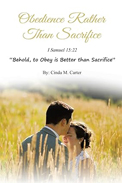
 |
Writer and poet Carter delves deeply into a religious tenet that has always attracted her, which is based upon the words of Samuel in the Holy Bible that "to obey is better than sacrifice." This concept crystalized for her as various incidents revealed its essential truth. When she moved to the home of her new husband, its décor was not what she preferred, but she decided to conform to his wishes, avoiding changes and thanking God for the opportunity to obey. Later, circumstances allowed her to redecorate, confirming her sense that her obedience had been rewarded. Interspersed with her poems are recollections of phases of her life in which the “obedience” perspective takes a firmer hold.
One of her engaging motifs is the occasional use of the letters of a poem’s title to start each line, as in this excerpt from "Mother’s Love": "M other we honor her... / O vercomer in trials and tribulations, / T ruthful for she keeps her word and her obligations." Carter’s creations also make a faith connection, based on biblical references or inspired by situations that readers can readily grasp, such as this passage from "Accepted": "We feel pain because of disappointments or promises that have been broken. / Then we ask ourselves, where is love’s token?"
Carter's poetry and memories are offered to encourage and enhearten. The poet reveals herself as someone with strong feelings and opinions whose life experiences will have resonance for anyone who spends some quiet time thinking before acting in any complicated life situation. The poems and their accompanying accounts will fulfill her stated wish that readers will "look to the heavens" and "get ready," exhortations which provide focus for group sharing and individual action.